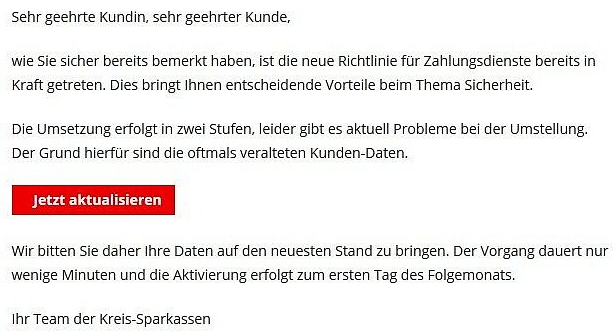New rules for online banking, new phishing emails!
There have been new rules for online banking since September 2019. Criminals are taking advantage of banks' obligation to inform their customers about the new rules. Example: An email pops up with the sender from Sparkasse. “Beratung-Kreis-Sparkassen” is written in the field. Because of the new guidelines, you have to keep your data up to date. The attached link leads to a page that looks like that of the Sparkasse. Login, password and other sensitive data will be requested.

Be careful: data will be stolen! If you look closely, you can see that the email does not come from Sparkasse, but from [email protected] . The email is fraud!
Christian Urban from the consumer advice center knows the phenomenon. “Changes like these are always exploited by fraudsters.” In this case, it is about the banks’ obligation to implement the requirements of the European Payments Directive. Bank customers have been required to use “strong customer authentication” since September. This means: Every customer must prove their identity with two independent components.
[mk_ad]
With such changes, customers are very insecure and thus increase the risk of falling for such phishing emails.
Distrust is appropriate because such emails are always structured in a similar way. Salutation, reason for the email, need to act quickly. Then a link, or alternatively a file attachment.
You have to know that banks do NOT send emails to request data.
I fell for it, what now?
If you followed the link, according to Urban, you shouldn't have a problem as long as you haven't entered any data.
Nevertheless, the following applies: keep an eye on your account, update virus programs , and have your computer checked if a harmful program is installed in the site's source code.
Data entered?
Change your password, inform your bank, file a criminal complaint with the police.
According to spokeswoman Sonja Rehwert, the police have the phishing emails sent to them in order to find out about the technical data, such as: B. IP address and email header to gain investigative approaches. If the fraud was successful and an injured party even initiated a payment, the police have an investigation approach via the recipient account.
Investigation is rather difficult because the perpetrators use fake email accounts to hide their identity. The Bielefeld police recorded 928 cases of computer crime in 2018. The number of unreported cases is likely to be much higher.
Related to this topic: What actually is phishing?
Source: Haller Kreisblatt
Article image: Shutterstock / By Yuriy Vlasenko
Author: Kirsten Suckert
Notes:
1) This content reflects the current state of affairs at the time of publication. The reproduction of individual images, screenshots, embeds or video sequences serves to discuss the topic. 2) Individual contributions were created through the use of machine assistance and were carefully checked by the Mimikama editorial team before publication. ( Reason )

